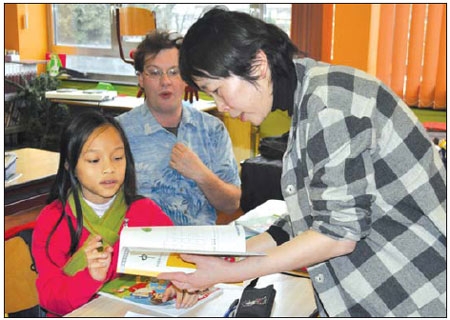More Europeans pick up Mandarin
Updated: 2011-02-25 10:25
By Fu Jing (China Daily European Weekly)
|
 The Eurochine Chinese School is seeing rising interest in the Chinese language. Wang Xiaomei / for China Daily |
Chinese language boom in brussels
Every Saturday morning, Patrial Hoornaert connects two speakers to an MP3 player and very soon lively music starts to bounce off the classroom walls inside the two-story primary school in Brussels.
Hoornaert then merrily joins his wife, Yao Shanshan, his daughter and up to 70 Chinese language learners following Chinese instructions by stretching hands, shaking heads, kicking legs and jumping.
This 10-minute exercise, which is practiced by nearly all Chinese students in schools and even universities across China during class break, is an essential part of the curriculum of Eurochine Chinese School, which is one of four such language schools operating in the European capital.
All of the tutors are China-born women and nearly all of their Belgian husbands and children attend the lessons.
"From very beginning we not only teach the language, but also culture; we even aim to make the language learners have an initial taste of China's education system," says Yao, explaining why the school inserts an exercise break into the weekend language school.
Yao has been living in Brussels for more than two decades after she left her hometown in Shanghai as an English teacher.
Three years ago she joined two Chinese women Chen Yan and Wang Xiaomei to open the school.
Hoornaert, 40, feels he has made much progress during past three years and can even sing a little Beijing opera.
"All of the teachers are dedicated and they know China and Chinese," Hoornaert explains. "And also they know how to teach us effectively."
The fees are kept low - children only pay 150 euros while adults pay 180 euros for the whole academic year, which usually starts in September and ends in June.
"All of the teachers come in as volunteers, and come here to have fun and to promote Chinese language," says Wang Xiaomei, co-head of the school.
Jean-Benoit Henry de Hassonville, 15, recently broke a leg playing soccer but his injury has not stopped him from hobbling to classes on crutches.
"I am dreaming of communicating with my Chinese friends in their own language," de Hassonville says.
De Hassonville recently befriended two Chinese students from Shanghai when they studied in Brussels last year, and he writes to them in French or in Chinese pinyin regularly.
"What's more, if I want to do business with Chinese, I should learn to speak the language," he says, adding that his parents actively support his Chinese lessons.
Wang says more Belgians and other Europeans have realized the importance of learning Chinese and class numbers are growing.
When the school opened three years ago, only 20 students attended but today there are nearly 70 students, ranging from six to 68-years-old.
More than 20 languages are used at the European Union level in Belgium everyday and English is often the most common language due to a multitude of international political organizations seated in the EU capital. Now the sounds of Mandarin are slowly being heard.
In the past, the majority of Mandarin learners were children of overseas Chinese but now more Europeans are focusing on Chinese. Even EU institutions have started Chinese language sessions for their staff.
"And more and more European diplomats have started to send their kids to learn Chinese," says Wang. "This is a new trend."
E-paper

Online shops boom in China
Low investment, quick returns offer profit-making opportunities for struggling students.
Something 'fishy' about this trick
Banking on success
Branded outlets move in
Specials

The green lantern
Environmental concerns are shedding new light on a colorful tradition

Inland interchange
Chongqing bets on its position as a hub for China's west.

Zooming in on Chinese skies
Helicopter companies ride on country's growing interest in luxury aviation.
